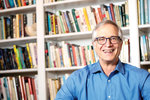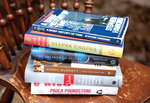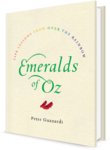


CHAPEL HILL — Longtime publishing professional Peter Guzzardi, like many people who grew up in the 1960s and 70s, had lots of exposure as a child to “The Wizard of Oz,” courtesy of perennial airings on network television.
“It was an annual ritual,” recalled the Chapel Hill-based writer and editor. “We had a black-and-white TV. CBS would air ‘The Wizard of Oz’ and we would gather around dutifully — children and parents — to watch the film.”
The classic 1939 movie, which follows the adventures of young Dorothy and her dog Toto in the aftermath of a Kansas tornado as they make their way along a yellow-brick road to the enchanted land of Oz, it turns out, is not only entertaining, but also loaded with wisdom.
“During my long career as a book editor, I’ve brushed up against a lot of wisdom,” Guzzardi writes in his newly-published book “Emeralds of Oz: Life Lessons From Over the Rainbow,” “yet so much of what I learned was right there in this extraordinary film I first watched as a child.”
Not that he was aware of it at the time of those childhood viewings.
“We kind of absorbed it on a cellular level,” said Guzzardi of the film, and the many lessons it presents, during an interview last Friday at the Breakaway Cafe at Briar Chapel.
“I think that’s what every classic does: it entertains you so you don’t really notice the medicine,” he said. “It’s got that spoonful of sugar, so you don’t notice that it’s gone down. But it has gone down.”
It would take the editor/author, now 68, a few years to realize this about “The Wizard of Oz,” but once he did, he set out to write a book about it, spending the last five or so years working on it, and viewing the movie more than 100 times. The resulting 160-page volume, both a self-help book and a unique journey through the classic film, was published last month by an imprint of HarperCollins.
Guzzardi — who as an editor worked on a number of notable books, including Stephen Hawking’s “A Brief History of Time,” Douglas Adams’ Hitchhiker novels, and 15 books by Deepak Chopra — has created what his friend and colleague Chopra calls “a powerful, near-magical tool for navigating any difficult situation.”
As he began his deep dive into “The Wizard of Oz,” Guzzardi began to uncover “little lessons,” or “emeralds,” of which he discovered nine. They form the basis for his book and, he said, can be applied in all real-life situations to address any of life’s obstacles.
The first emerald, for instance, is “listen to your longing.”
“Yearning arises,” Guzzardi writes in the chapter on this first emerald, “when the gulf between what you desire and what you possess becomes too great, which makes it all-important to recognize this feeling when it shows up in your life. It’s putting you on notice.”
The second emerald: See the situation as if for the first time, setting aside memories, associations, biases and prejudices.
If Guzzardi could impart only one of the nine emeralds of wisdom, which would he choose?
“I guess if I had to choose one,” he said, “I might choose number four: choose compassion. Compassion is so fundamental to our life experience and, painfully, it seems to be in such short supply right now. We tend to forget that compassion is the key to happiness for us and for other people, to put yourself in another person’s shoes and to feel for them, and then to turn that light of compassion on yourself.”
Although centered around a movie which, in August, will celebrate 80 years since its first screening, Guzzardi said the wisdom contained within “The Wizard of Oz’s” one-hour-and-52-minute running time are as timely now as ever, if not more so.
“It’s certainly relevant,” he said, “again, whether it hits you over the head with its relevance or not. The themes that are being explored in the film are so timely. You think about it. What are the prevailing feelings in America these days? Divisiveness. Feelings of helplessness. Feeling lost and confused in what seems to be a crazy world. These are the issues that Dorothy grapples with.”
The book, only recently published, hasn’t had a chance to climb any bestseller lists yet. And the longtime editor knows a book such as his, by an author without a recognizable name — “My last name isn’t Grisham; and my first name isn’t John,” he said, good-naturedly — is a tougher sell than some. He likens publishing books to throwing spaghetti against a wall and seeing what sticks. Of his book, he said he’s waiting to see if it sticks or slides.
Early response has been very positive. One reader, reviewing the book on Amazon, wrote: “No matter whether you’ve seen ‘The Wizard of Oz’ once or are an ardent fan, Peter Guzzardi’s powerhouse book will speak volumes to you. By exploring the great mystical themes within the film, Guzzardi guides us toward overcoming the fear so epidemic today, moving past our innate human blindness, and finding the strengths that we all have within us. The book offers compassionate and urgently needed wisdom for a time of tribalism, distraction, and short-sightedness. I will be joyfully turning back to this book for years to come.”
Guzzardi is working hard to promote it, with four promotional appearances on its behalf behind him and more planned, including a June 1 discussion, from 11 a.m. to noon, at McIntyre’s Books in Fearrington Village.
At recent promotional events in New York and Chapel Hill, where the author is well-known in local publishing circles, Guzzardi faced “packed houses,” he said. But last week at an independent bookstore in Greensboro, he spoke to an audience of only four.
At first disappointed and embarrassed by the low turn-out, he said, he nevertheless left the event happy.
“It was fabulous,” he said. “They asked great questions. There were four of them and they bought six books. I literally thought, ‘Take me. I could go right now and die happy.’”
It’s about how you measure success, he said, and while he would naturally like his book to be a publishing success, he’s happy it’s already reached some people. Some early readers of the book have reached out to the author, sharing with him how the emeralds he’s identified and illuminated have helped them.
“It’s great to hear from people and that it’s doing something good for them,” he said, “because that was the goal all along.”
Randall Rigsbee can be reached at rigsbee@chathamnr.com.